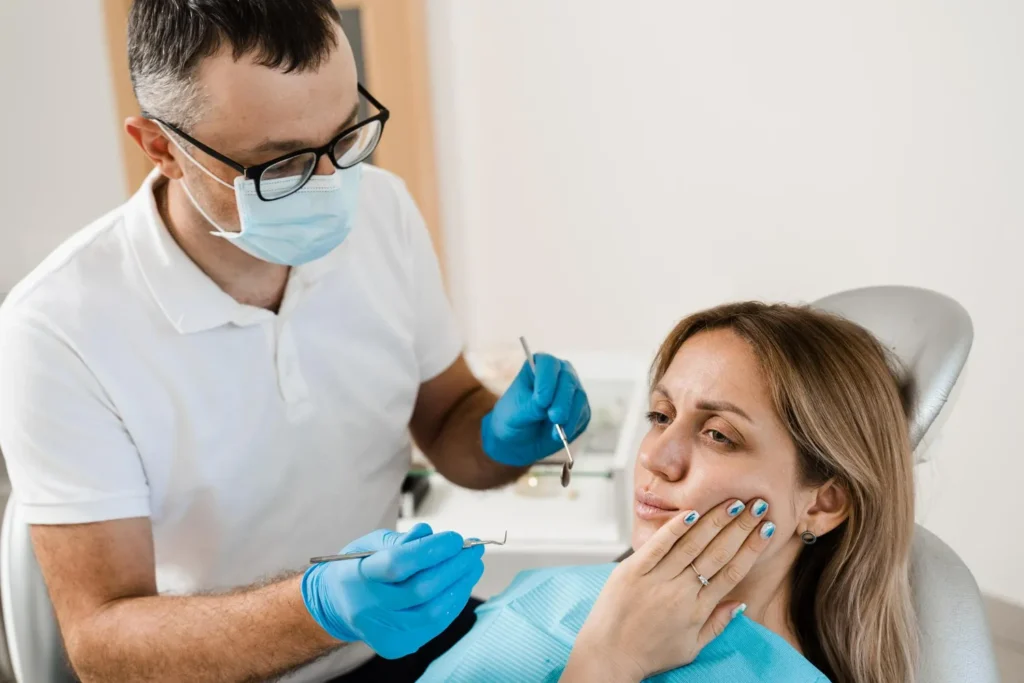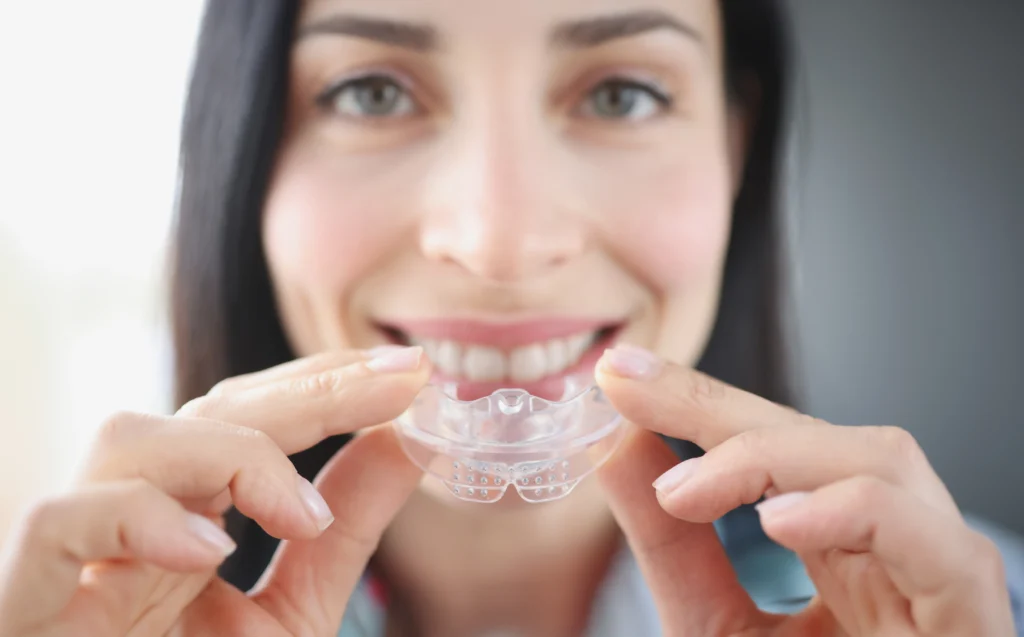Waking up with a dull ache in your jaw or a sharp pain in your teeth might seem like an isolated issue, but the culprit could be a common condition known as teeth grinding, or bruxism. While this condition often goes unnoticed, especially if it occurs during sleep, it can lead to significant discomfort, tooth sensitivity, and even serious dental problems. Understanding what causes teeth grinding can help you take proactive steps to protect your oral health, especially when it overlaps with conditions like tooth grinding and sleep apnoea.
What is Bruxism and How Does It Lead to Toothache?
Bruxism refers to the unconscious act of grinding or clenching your teeth, often triggered by stress, anxiety, or sleep disorders. While it can happen during the day, it typically occurs at night when you’re unaware. The constant pressure of grinding can cause significant damage to your teeth, leading to pain, sensitivity, and more serious dental issues.
How Does Teeth Grinding Cause Tooth Pain?
Teeth grinding can lead to several forms of dental discomfort. Here’s how bruxism impacts your teeth and jaw:
- Enamel Wear: Repeated grinding wears down the enamel, the protective outer layer of your teeth, making them more vulnerable to damage.
- Dentin Exposure: Once the enamel is worn away, the underlying dentin becomes exposed, which is more sensitive to hot, cold, and sweet foods.
- Tooth Damage: The pressure from grinding can cause cracks, fractures, or chips in the teeth, further exacerbating pain.
- Jaw and Muscle Pain: Clenching can overwork the jaw muscles, leading to soreness and discomfort in the face and neck.
- TMJ Disorders: The temporomandibular joint (TMJ), which connects the jaw to the skull, can become stressed, leading to pain and jaw dysfunction.
- Headaches and Earaches: Grinding can also contribute to headaches and earaches due to the strain on the jaw muscles.
Understanding these symptoms is crucial for early intervention, which can help prevent long-term damage to your teeth and jaw.
Common Symptoms Linked to Teeth Grinding and Tooth Pain
Many individuals experience bruxism for years without realising it, as the symptoms often develop gradually. A toothache is just one of the potential signs of teeth grinding. Other common symptoms include:
- Waking up with jaw pain or stiffness
- Sore or tired jaw muscles
- Flattened, chipped, or fractured teeth
- Worn-down enamel on the biting surfaces
- Tooth sensitivity to hot, cold, or sweet foods
- Pain that feels like an earache, in some cases, may relate to issues like wisdom teeth causing a jaw ache.
- Frequent headaches, especially upon waking
- Disturbed sleep or difficulty falling asleep
If you notice these symptoms, especially after a night’s sleep, it may be time to consult a dentist for an accurate diagnosis.

Why Night-Time Grinding Goes Unnoticed
One of the challenges of diagnosing bruxism is that it often occurs during sleep. People typically grind their teeth at night without being aware of it, and the sound of grinding might not always be noticeable to the person affected.
Does teeth grinding cause tooth pain during sleep? Absolutely. The pressure exerted on the teeth while grinding can be far greater than what occurs during regular chewing, leading to tooth damage and discomfort.
While it may seem subtle, the cumulative effects of grinding over time can cause persistent tooth pain, often described as a deep ache or sensitivity rather than a sharp, localised pain. Recognising the symptoms early can help prevent long-term damage.
The Role of Stress in Teeth Grinding and Tooth Pain
Stress and oral health are closely connected; in fact, stress is one of the most significant contributors to bruxism. Whether it’s caused by work, personal life challenges, or anxiety, stress can lead to unconscious clenching or grinding of the teeth. This often happens without the person realising it, especially during sleep.
During stressful periods, the frequency and intensity of teeth grinding may increase, leading to more severe tooth pain and discomfort. People dealing with high levels of stress may find that their symptoms worsen in particularly tense times, such as after a long day or during a busy work week.
Potential Long-Term Effects of Untreated Bruxism
If left untreated, bruxism can lead to severe and permanent dental damage. Over time, the effects of grinding can worsen, leading to:
- Increased tooth sensitivity: The continuous wear on enamel exposes the more sensitive dentin beneath, making your teeth more vulnerable to temperature changes and certain foods.
- Dental fractures or mobility: The excessive force from grinding can cause teeth to crack, chip, or even become loose.
- Gum Recession: Excessive pressure from clenching and grinding can affect the gums, causing them to recede and expose more of the tooth.
- Chronic jaw dysfunction: Long-term grinding can result in persistent jaw pain, clicking sounds, or difficulty in moving the jaw.
- Tooth loss: In severe cases, untreated bruxism can contribute to tooth instability and, eventually, tooth loss.
Early treatment and intervention are essential to prevent these complications from escalating and to maintain good oral health.
How Dentists Diagnose Bruxism and Its Link to Tooth Pain
Diagnosis of bruxism typically involves a comprehensive examination by a dentist, who will look for signs such as:
- Worn enamel or flattened tooth surfaces
- Cracks, chips, or fractures in the teeth
- Tenderness in the jaw muscles
- Abnormal wear patterns that suggest grinding
In some cases, your dentist may recommend additional tests, including a bite analysis or dental X-rays, to assess the extent of the damage. If sleep bruxism is suspected, a sleep study may be advised to determine whether grinding is occurring during sleep.
Available Treatments for Teeth Grinding and Toothache Relief

If you are diagnosed with bruxism, your dentist will recommend treatment options tailored to your needs. The most common treatments for bruxism include:
- Night Guards: Custom-fitted dental appliances worn at night to protect the teeth from grinding. These guards help reduce pressure and prevent tooth damage.
- Stress Management: Addressing the underlying cause of grinding by incorporating relaxation techniques, cognitive behavioural therapy, or lifestyle changes can help reduce stress and, in turn, grinding.
- Dental Correction: If teeth are already damaged, treatments such as fillings, dental crowns, or orthodontic work may be necessary to restore function and aesthetics.
- Muscle Relaxants: In some cases, short-term medications can help relieve jaw tension and reduce muscle pain.
- Botox Injections: For severe cases, Botox injections may be used to reduce muscle hyperactivity and alleviate discomfort.
When to Seek Dental Advice for Grinding-Related Tooth Pain
If you are experiencing tooth pain or other symptoms associated with bruxism, it’s important to consult with a dentist as soon as possible. Early intervention can prevent further damage and improve your overall comfort. When visiting your dentist, be sure to mention:
- When the pain typically occurs (morning, night, or during the day)
- Whether you’ve been told you grind your teeth at night
- Any history of headaches, jaw pain, or dental issues
- Difficulty sleeping or feeling unrested upon waking
These details will help your dentist provide a more accurate diagnosis and recommend the best course of action.
Simple Steps You Can Take at Home to Ease Tooth Pain from Grinding
While professional treatment is essential for long-term management of bruxism, there are also a few home remedies you can try to alleviate tooth pain and discomfort in the short term. Here are some practical steps you can take to relieve tooth pain caused by teeth grinding:
- Apply a Warm Compress: A warm compress can help relax the jaw muscles and relieve soreness. Simply apply a warm, damp cloth to the side of your face for 10 to 15 minutes.
- Practice Relaxation Techniques: Reducing stress can help reduce the frequency and intensity of grinding. Try deep breathing exercises, yoga, or meditation to lower your stress levels.
- Over-the-Counter Pain Relief: Non-prescription pain relievers, such as ibuprofen or acetaminophen, can help manage pain and reduce inflammation.
- Avoid Chewing Non-Food Items: Refrain from chewing pencils, pens, or other non-food items, as this can put extra strain on your jaw muscles.
- Mind Your Diet: Avoid consuming hard foods that may exacerbate jaw pain, and try to reduce caffeine intake, especially in the evening, as it can contribute to muscle tension.
While these steps can provide temporary relief, it’s important to consult a dentist for a proper diagnosis and treatment plan to address the root cause of bruxism.
Final Thoughts
Tooth pain is not always caused by decay or infection; sometimes it’s a sign of something more subtle, like bruxism. Teeth grinding can lead to a range of dental issues, from tooth sensitivity to more severe problems such as fractures and jaw dysfunction. If you suspect bruxism is affecting your oral health, don’t delay in seeking professional advice.
At Waldron Dental, we are committed to helping you address bruxism early to prevent further damage. Our team offers comprehensive treatments, including custom night guards and stress management strategies, to relieve tooth pain and protect your teeth.
If you’re experiencing tooth pain or suspect you may be grinding your teeth, contact us today to schedule a consultation and take the first step toward relief.













